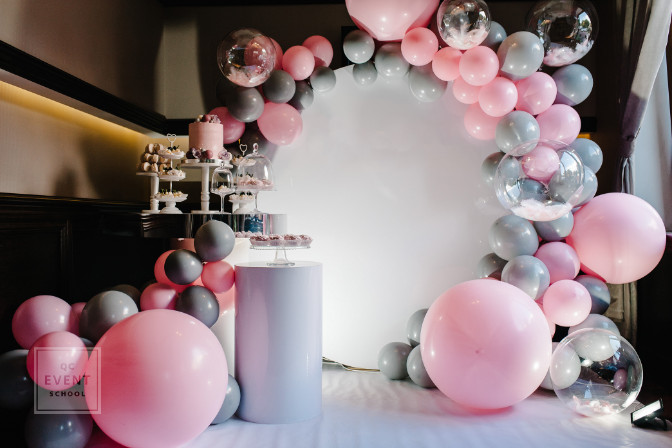
The Job Description of an Event Planner
Do you have an interest in becoming an event and/or wedding planner, but don’t quite know what exactly that means? For instance, what sort of things would be a normal part of your job? Are there different kinds of event planners? If so, what sets them apart?
Here, we’ll break down an event planner’s job description. This way, you’ll know exactly if this is the career for you – and how to get started!
The 3 different kinds of event planners
To start, there are 3 main types of event planners:
1) General / private event / party planners.
This kind of event planner typically covers private events and parties such as:
- Luxury events
- Gender reveal parties
- Baby showers
- Graduation celebrations
- Baptisms & other religious celebrations
- Anniversaries,
- Birthdays
- Retirement & other milestone parties
- And more!
2) Corporate event planners.
With a focus in event management, a corporate event planner is responsible for organizing business events. Examples would include:
- Fundraisers, galas, and charity events
- Corporate dinners
- Product launches
- Holidays parties
- Seminars, expos, and Trade Shows
- Executive retreats
- And much more!
3) Wedding planners.
A very popular career option in the event planning world, a wedding planner (logically) helps clients to map out, put together, and execute their wedding days. In this field, one can also train and certify themselves to be a luxury wedding planner and/or a destination wedding planner, too!
What all event planners have in common
Regardless of the type of events you prefer to coordinate, the goal of every job is exactly the same:
To work with your client in order to identify her wants, needs, and overall vision. Then to use your expertise to provide that for her, in a way that produces the most customer satisfaction.
Basically? Do what you can to make your client’s dreams come true!
How do you do this?
All of the 3 types of event planners listed above have similar To-Do checklists. The tasks therein must be completed in order to successfully pull off any client’s event. Here are 5 regular parts of any event planner’s job description…
1 – Having an initial consultation with the client
Before any planning can be done, you will first need to schedule a meeting with the client. Here, the client will typically have questions for you to answer, so they can better understand your services. They want to know that you’re the right fit for them, after all!
Similarly, this is the time for YOU to ask any and all questions needed for you to best understand the vision they have for their big day. From when they want the event to take place, to the budget, there is a lot of critical info you’re going to need in order to get the job done.
We’ve already compiled a list of the Top 7 questions every planner should ask during each consultation, so feel free to check them out here!
2 – Drawing up and signing a contract
Before you start doing any planning for your client’s event, you need to make sure you’re legally protected. Every event planner needs to have a contract drawn up and signed by all parties, for EVERY single job. The contract should clearly outline the services you offer, fees, clauses, and any other pertinent details. You can usually use a contract template, but make sure the template has been reviewed by an attorney before you start using it for all your clients.
This contract is JUST as much for the client’s benefit as well! Its entire purpose is to keep all parties liable and safe! If you’re unsure what should and shouldn’t be included, feel free to look over this do’s and don’ts list for writing your event planner contract.
3 – Working with different vendors
When organizing an event, it’s almost a guarantee that you’ll be working with at least one vendor/supplier. Ask yourself, does you client’s big day require any of the following:
- Food
- Flowers
- A venue
- Music
- Photographers
- Videographers
- Transportation
- Décor
- Cake
- Etc.?
If so, then it’s YOUR responsibility to find the businesses capable of providing these services. But remember: your client is expecting a certain level of quality from you. So it’s not enough to do the bare minimum and secure the first vendor that shows up on Google. Do your research to ensure that you only hire the best!
If you wouldn’t want them being part of your own celebration, then you shouldn’t use them for someone else’s.
4 – Keeping your clients within their budget
This part is huge! Some clients may come in already with a set figure in their heads. Others may be a little less certain, and will need your help determining a budget that’s realistic. Once it’s been set, though, it’s your responsibility to try and keep your clients within it as much as humanly possible.
Use your connections, your knowledge, and your creativity to help them save money wherever possible (without sacrificing quality). Importantly, make sure you NEVER go above the agreed upon budget without first getting your client’s permission in writing.
5 – Being a human calendar
As an event planner, you’re going to need to be EXTREMELY organized at all times. After all, it’s you who’s in charge of keeping on top of everything. This also means the timeline leading up to the event, and the schedule on the day of. If deadlines are approaching, you’ll be expected to remind your client with ample notice.
You’ll need to remember when deposits are due and when RSVPs are needed. It’ll be up to you to stay in touch with the other vendors, and organize everything with the venue. On the big day, you’re the one who needs to make sure everything plays out when and where it should.
The idea is to relieve the client from having to worry about ANY of these things!
Other major areas of the event planner job description:
Whether you’re a private planner or wedding planner, corporate planner or party planner, there are a few other crucial things that will always be part of your job description if you want to be successful:
- Building up a strong portfolio. Your portfolio is a visual resume for potential clients. A strong event planning portfolio should showcase your qualifications, reviews, and a photo gallery. Here are 3 solid online portfolios to look up to!
- Putting time and effort into your online presence. We live in a digital world, where social media plays a huge role in how we connect with others. The way you use your online social platforms can give you the perfect opportunity to showcase your brand, build a following, and get your name out there. Alternately, no presence – or a bad one – can do some heavy damage to your reputation.
- When you have a positive professional experience with someone, keep that contact! This can be another vendor, a past client, etc. You never know when it’ll come in handy. Trust us: in the event planning world, you will rely on your network more often than you realize.
- Educating yourself. Any event planner who wants a successful career is going to want to learn as much as they can about the field, and become professional certified. Not only does it help you, your skill-set, and your portfolio… It’ll look WAY better to clients, and give you a leg up on your competition. We cannot stress enough how valuable event planning school and courses are to your career!
Now that you know the foundation of any event planner job description, you can delve even deeper. Find out some of the other qualifications and characteristics needed so you can go from good to great! Do you have any more to add? Tell us in the comments!






Great content and very useful for the event planner job descriotion.